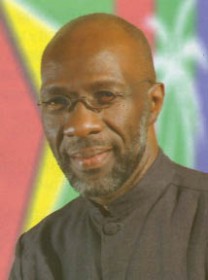-Alexander
The PPP/C administration has been dubbed “involuntary disciples” of Linden Forbes Sampson Burnham by University of Guyana Registrar and Chairman of the Burnham Foundation Vincent Alexander.

He was speaking at a symposium held at the Queen’s College auditorium on Friday as part of a month of activities organised by the PNCR to commemorate the 25th death anniversary of Burnham, Guyana’s first executive president. Alexander was at the time recapping the feature presentation of historian Brigadier General (retd) David Granger who had spoken on the ‘Thoughts and times of Burnham.’
As part of his presentation Granger read several quotations addressing the importance of food security, co-operative societies, housing and education and asked the audience who made the statements.
“Can you remember who said Guyana is the only country within Caricom that has the capacity to feed itself and is also a net exporter of food? Can you remember who said cooperative societies serve a very meaningful purpose not only to pass on wealth and knowledge but also to unite the community and its people while providing their livelihood? Can you remember who said our housing policy will further demonstrate my administration’s thrust to heighten the dignity of Guyanese by transforming them into homeowners?”
The majority of attendees responded Burnham, and the general then revealed that the statements were made respectively by Agriculture Minister Robert Persaud in June 2009; Region 2 Chairman Ali Baksh in February this year; and President Bharrat Jagdeo on Independence Day last year.
“These were not the words of Forbes Burnham, they were the words of his present day disciples, people who, unconsciously perhaps, are continuing the work which he commenced so long ago,” Granger said.
He said he chose to address the time of Burnham because it was impossible to pass judgment on him using the standards of today. According to Granger, Burnham’s “glory” was bedevilled by misunderstanding and his record is incomplete.
In his presentation Granger culled excerpts from what he called Burnham’s public life, the period stretching from 1945 and his legal training in Britain, to the economic woes of the 1980s. It included takes on Burnham’s “split” from the PPP, his role in Guyana’s post-Independence leadership; his Caribbean unity agenda; and his support for an end to colonialism in Africa.
Granger said the former president responded to the times in which he found himself and what he perceived as the injustices of colonialism.
“His thoughts were moulded by his perceptions of the unequal distribution of wealth, the denial of opportunities to the lower classes at the global, local and regional levels.”
Friday’s symposium was organised by the Forbes Burnham Foundation which is dedicated to keeping the “ideas and practices” of the late president alive. There was also an exhibition of Burnham speeches, publications and photos at the event.
Other commemorative activities include a variety concert at the National Cultural Centre on August 30 and a “cultural finale” at the Square of the Revolution on September 4.





